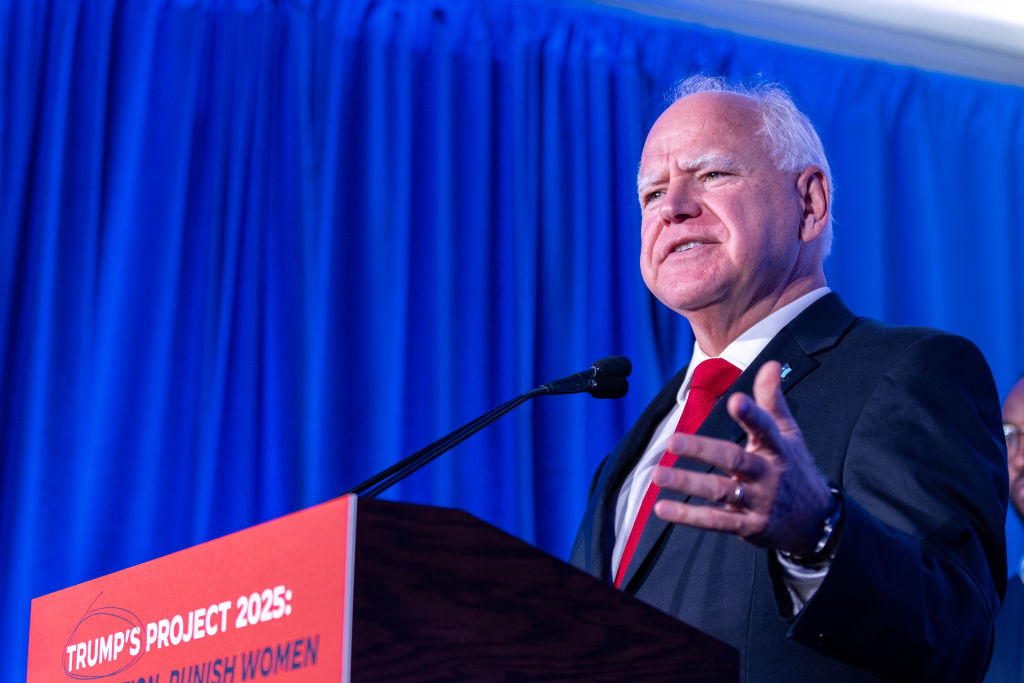Today Democratic presidential nominee Kamala Harris announced that she had selected Minnesota Governor Tim Walz to be her running mate. The decision was a surprise, as many observers had considered Pennsylvania Governor Josh Shapiro to be the favourite throughout her search process. However, picking Walz may give Democrats a chance to broaden their appeal with voters they’ve been losing for a long time.
Walz’s biography offers some hints of this possibility. His presence makes this the second Democratic ticket in a row to feature a candidate who did not attend an Ivy League school. He is also notably the first Democrat on a presidential ticket since Jimmy Carter not to have gone to law school. Before entering politics, he was a schoolteacher and high-school football coach, and served in the Army National Guard.
Walz also spent six terms in Congress representing the state’s First Congressional District, a large rural area whose population is fairly working-class and which grew more Republican-leaning during his tenure. He proved to be popular there, outrunning the Democratic presidential nominees in three straight elections, including narrowly winning the district while Hillary Clinton lost it by 16 points.
Moreover, throughout his career Walz has enjoyed the backing of organised labour and championed economically populist policies to benefit workers, including expanded sick leave, bans on non-compete clauses, and protections against wage theft. He also signed $2.6 billion to fund infrastructure projects that required union labour and removed the college degree requirement for the vast majority of state jobs, giving non-college-educated residents a path toward upward economic mobility.
On the whole, this experience paints a picture of the type of candidate who might be able to help Harris expand her appeal with key constituencies that Democrats have been losing for some time: namely, the white working class.
But Walz carries some downsides as well. Unlike Shapiro, he does not hail from a swing state — a tipping-point state, at that — so his presence doesn’t offer Harris the immediate chance to increase her odds of winning the Electoral College. And even in his run for governor in 2018, Walz did not demonstrate much ability to bounce back in areas of the state that had drifted away from Democrats during Obama’s presidency, including in his old district. His inability to outpace even Joe Biden in many of these areas stands in contrast to Shapiro, who ran ahead of the President all across Pennsylvania, often by double digits.
As governor, Walz has also taken actions that may engender reservations in the broader electorate. He faced intense criticism over what many perceived as a reluctance to act in the face of violent anti-police protests during the summer of 2020, protests whose damage cost the city of Minneapolis at least half a billion dollars. (Walz himself later called his response an “abject failure”.) He has also backtracked on his previous support for gun rights in Congress, which may not sit well with some rural and working-class voters. All this could risk belying his image as a folksy blue-collar guy from small-town America.
In addition, Shapiro was particularly loathed by the anti-Israel Left; by selecting Walz, Harris has already opened herself to attacks that she is more interested in placating this faction than standing up to it. Walz also helped kickstart the trend of calling Republicans “weird”, which may not be well-received by an electorate that has lamented the recent decline of respect in American politics.
To be sure, the research on the extent to which vice-presidential selections boost presidential campaigns is mixed, though it mostly finds that any impact is relatively limited. These picks are typically made with an eye toward “balancing” a ticket — and, perhaps even more importantly, not damaging it. Harris seems to be hoping that Walz has more upside than not — that most voters will find his Midwestern “dad energy” affable rather than off-putting, and his track record of pushing for policies that benefit the working and middle classes attractive. Time will tell whether her instinct was correct.











Join the discussion
Join like minded readers that support our journalism by becoming a paid subscriber
To join the discussion in the comments, become a paid subscriber.
Join like minded readers that support our journalism, read unlimited articles and enjoy other subscriber-only benefits.
Subscribe